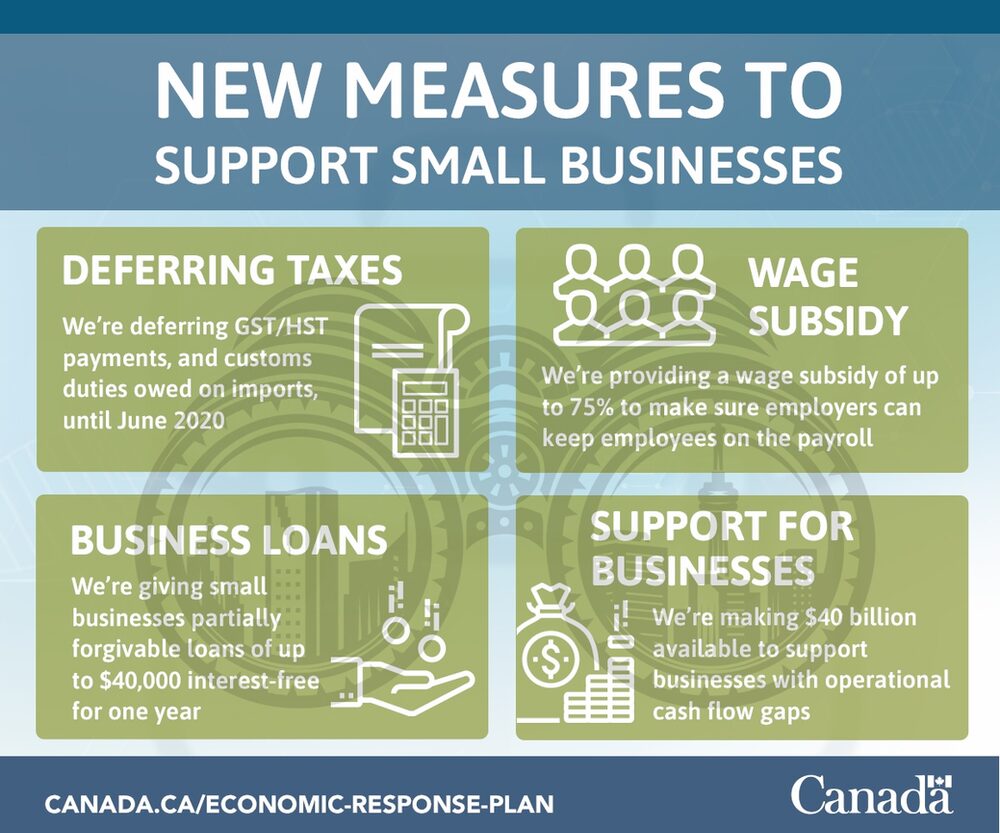
Canada Emergency Business Account for Small Business (CEBA)
On March 27, Prime Minister Trudeau announced additional measures to support businesses through this time. Scotiabank, together with other leaders in the banking community, has been consulting with the government on these measures, designing them specifically to help small business employers with their most pressing needs and position the economy to recover.
What is CEBA?
CEBA is a government-guaranteed loan of $40,000, designed to help small business owners meet their immediate cash flow needs. To be eligible, businesses must have paid between $50,000 and $1 million in payroll for 2019.
Key details include:
- 0% interest until December 31, 2022.
- No principal payments until December 31, 2022.
- Principal repayments can be made voluntarily at any time, without fees or penalties.
- $10,000 loan forgiveness is available, provided $30,000 is paid back on or before December 31, 2022.
- If any part of the balance is not paid by December 31, 2022, the remaining balance will be converted to a three-year term loan at 5% annual interest, paid monthly, effective January 1, 2023.
- The full balance must be repaid no later than December 31, 2025.
Check with your Financial Institution for information on how to apply.
For more details on The Canada Emergency Business Account, ,click here
Wage Subsidy
To help businesses get through these tough economic times, the Prime Minister, Justin Trudeau, announced that the Government is proposing to introduce a wage subsidy of 75 percent for qualifying businesses, for up to 3 months, retroactive to March 15, 2020.
The highlights of the program are as follows:
- The Canada Emergency Wage Subsidy would apply at a rate of 75 percent of the first $58,700 normally earned by employees – representing a benefit of up to $847 per week. The program would be in place for a 12-week period, from March 15 to June 6, 2020.
- Eligible employers who suffer a drop in gross revenues of at least 30 percent in March, April or May, when compared to the same month in 2019, would be able to access the subsidy.
- Eligible employers would include employers of all sizes and across all sectors of the economy, with the exception of public sector entities.
- For non-profit organizations and registered charities similarly affected by a loss of revenue, the government will continue to work with the sector to ensure the definition of revenue is appropriate to their circumstances. The government is also considering additional support for non-profits and charities, particularly those involved in the front line response to COVID-19. Further details will be announced in the near term.
- An eligible employer’s entitlement to this wage subsidy will be based entirely on the salary or wages actually paid to employees. All employers would be expected to at least make best efforts to top up salaries to 100% of the maximum wages covered.
The government has availed several programs to support businesses with the following needs. Links have been built into each measure which you can click to follow for additional details and, where applicable, apply:
- Avoiding layoffs and rehiring employees
Canada Emergency Wage Subsidy
Extending the Work-Sharing program - Reduced and deferred payments
More time to pay income taxes
Deferral of Sales Tax Remittance and Customs Duty Payments until June - Access to credit
Establishing a Business Credit Availability Program
Canada Emergency Business Account (Interest-free loans up to $40K due to launch mid-April, 2020) - Supporting financial stability
Launching an Insured Mortgage Purchase Program
Bank of Canada actions
Office of the Superintendent of Financial Institutions actions - Support for self-employed individuals
Canada Emergency Response Benefit (CERB)
Deferral of Sales Tax Remittance and Customs Duty Payments until June
More time to pay income taxes





